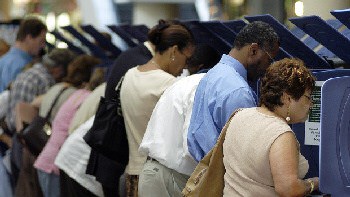United States Welcomes OAS Resolution on Cuba
By Merle David Kellerhals Jr.
WASHINGTON — The United States welcomes a decision by the Organization of American States to lift a 47-year-old suspension against Cuba and allow Cuba to be readmitted when it makes a commitment to the organization’s democratic values, the State Department said in a prepared statement.
Secretary of State Hillary Rodham Clinton said June 3 that the decision, made during the 39th annual OAS General Assembly meeting in San Pedro Sula, Honduras, is consistent with the United States’ forward-looking approach to improving relations with Cuba and the Western Hemisphere.
“Many member countries originally sought to lift the 1962 suspension and allow Cuba to return immediately, without conditions,” Clinton said in the prepared statement. “Others agreed with us that the right approach was to replace the suspension — which has outlived its purpose after nearly half a century — with a process of dialogue and a future decision that will turn on Cuba’s commitment to the organization’s values.”
The resolution, approved unanimously by the 34-nation organization, requires that Cuba ask to rejoin the OAS if it wants membership, and that it subscribe to the OAS Charter and the Inter-American Democratic Charter, which defends democracy, self-determination, noninterference, human rights, development and security, said Dan Restrepo, who is a special assistant to the president and is senior director for Western Hemisphere affairs on the U.S. National Security Council.
“What we’ve seen today is really a testament to the hard work of multilateral diplomacy,” Restrepo said in a teleconference with journalists June 3. “The United States and other countries from various parts in the hemisphere fought, defended and prevailed in saying that this was not an automatic process, that ‘yes, let’s leave an argument of the past in the past, let’s not become prisoners of the past, but let us ensure that we are defending the basic principles of democracy and human rights and nonintervention and noninterference as the path forward to Cuba’s return to the organization.’”
For Cuba to return to the OAS, it must accept everything the OAS stands for and the rules it abides by, Restrepo said. Lifting the 1962 suspension does not mark an automatic return for Cuba, he said.
Assistant Secretary of State Thomas Shannon said in the teleconference that the OAS resolution was based on a resolution presented by Clinton June 2, before she had to leave to join President Obama in Cairo, Egypt, for meetings with Egyptian officials. The resolution was developed after extensive conversations and negotiations with a broad range of partners in the organization, he said.
“It is the product of a collaborative dialogue with key partners around the hemisphere,” Shannon said. “We want a forward approach on Cuba, not a backwards approach.”
“Ultimately … what the region made clear to us in our talks that had been ongoing for quite some time is that they wanted to find a way to deal with Cuba that wasn’t based on Cold War instruments.”
Shannon said that what President Obama made clear at the Summit of the Americas held in Trinidad and Tobago is that the United States wants a new relationship with Cuba that is forward-looking, and one based on the future and well-being of the Cuban people.
Shannon said that during the negotiations on the Cuba resolution, many countries that had wanted to simply permit Cuba to rejoin the OAS without conditions realized what that might mean and recognized that the resolution needed two parts: one to lift the 47-year-old suspension on membership, and the second part to require a process based on the guiding principles of the OAS.

